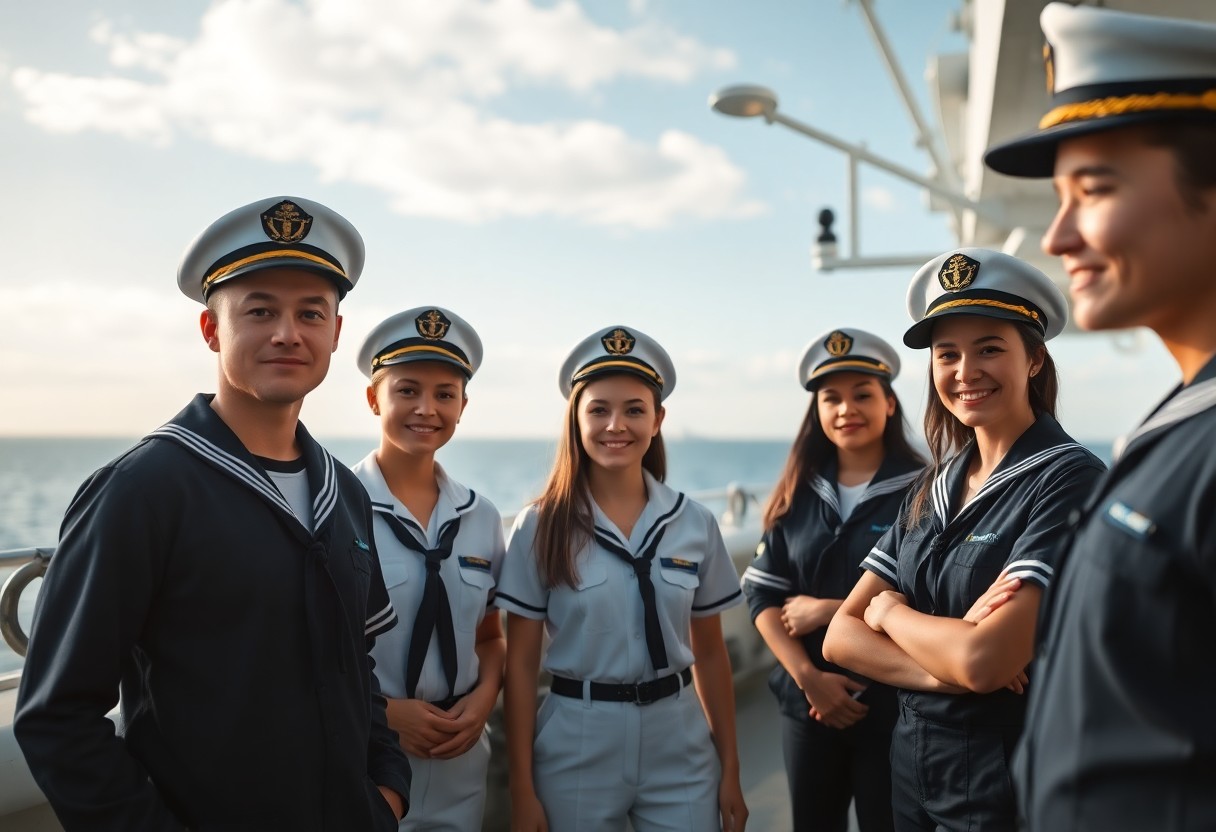You have the opportunity to initiate on an exciting career as a merchant navy officer, where you will navigate the world’s oceans while enjoying a range of experiences. To achieve this, you need to acquire the necessary education, training, and certifications that will equip you with the skills to handle the rigorous challenges of maritime operations. Embrace the adventure and responsibility that comes with the role, as you contribute to global trade and logistics, all while working aboard large vessels. In this guide, you will uncover the steps to make your dream a reality.
Table of Contents
Key Takeaways:
- Educational Qualifications: A degree in marine engineering, nautical science, or a relevant field is crucial for aspiring merchant navy officers.
- Training & Certification: Obtain necessary certifications, including STCW (Standards of Training, Certification, and Watchkeeping), to be eligible for positions at sea.
- Work Experience: Gain practical experience through internships or cadet programs, as this is key to advancing your career in the merchant navy.
Understanding the Merchant Navy
Your journey into the Merchant Navy opens up a world of opportunities in maritime trade and transport. This important sector involves the operation of commercial ships that carry cargo across international waters and play a significant role in global commerce. By joining the Merchant Navy, you are initiateing on a path that not only offers adventure and travel but also a chance to develop valuable skills and expertise in a dynamic work environment.
Overview of the Merchant Navy
If you’re considering a career in the Merchant Navy, it’s important to understand that it encompasses a variety of services and professions related to maritime transport. This fleet of commercial vessels operates under different flags and is involved in transporting goods and passengers worldwide. As a vital part of the global supply chain, the Merchant Navy ensures that trade flows smoothly, contributing significantly to economies around the world.
Roles and Responsibilities of an Officer
If you choose to become an officer in the Merchant Navy, your responsibilities will encompass a wide range of tasks important for the safe and efficient operation of the ship. From navigating and steering the vessel to managing crew members and ensuring compliance with safety regulations, you will play a pivotal role in the daily operations of maritime transport.
A Merchant Navy officer is tasked with numerous responsibilities that are vital for the smooth running of the vessel. These include navigating through various waters, performing safety drills, monitoring the ship’s cargo, and ensuring that all legal and environmental regulations are followed. Officers must also handle emergency situations effectively, maintain communication with the shore, and lead a team of crew members to foster a secure and cohesive working environment. The role is both challenging and rewarding, as it combines elements of leadership, technical skills, and a commitment to safety at sea.
Educational Requirements
Now, to become a merchant navy officer, you need to meet specific educational requirements. Generally, this involves completing your higher secondary education with a focus on science subjects such as Physics, Chemistry, and Mathematics. Additionally, you may pursue undergraduate degrees in maritime studies or engineering, which will further equip you with the necessary knowledge and skills for a successful career at sea.
Maritime Degrees and Courses
Requirements for a successful career in the merchant navy include obtaining relevant maritime degrees or courses. A Bachelor’s degree in Nautical Science, Engineering, or Marine Transportation is particularly desirable. These programs provide you with the crucial theoretical knowledge and practical skills needed to navigate and operate vessels effectively.
Training Institutes and Certifications
To pursue a career as a merchant navy officer, it’s crucial to complete training at reputable maritime institutes and acquire necessary certifications. Various institutes offer programs that ensure you are well-prepared for the challenges of maritime operations. Certifications like STCW (Standards of Training, Certification, and Watchkeeping) are vital to obtaining your crucial skills and competencies.
Maritime training institutes often provide a comprehensive curriculum that includes both theoretical knowledge and stringent practical training at sea. These institutes guide you through various certification programs that focus on safety, navigation, and ship operations. Completing these programs not only enhances your employability but also ensures you possess the skillset necessary to tackle the challenges you may face at sea, making you a valuable asset to any maritime crew.
Essential Skills for Success
Keep in mind that succeeding as a merchant navy officer requires a mix of technical and interpersonal skills. You must not only have a strong understanding of navigation and machinery but also be able to lead your crew effectively while working as part of a team. Building a solid foundation in these areas will set you on the path to a rewarding maritime career.
Navigation and Seamanship
To excel in your role, it’s vital to master navigation and seamanship. This requires a comprehensive understanding of maritime laws, charts, and weather patterns, as well as hands-on experience with various navigational tools. You will be responsible for safely guiding your vessel and ensuring compliance with international maritime regulations.
Leadership and Teamwork
For your success in the merchant navy, strong leadership and teamwork skills are necessary. As an officer, you will lead a diverse crew and must be able to motivate and coordinate your team effectively.
A successful merchant navy officer embodies strong leadership qualities while fostering collaborative teamwork. You will need to navigate high-pressure situations that require decisiveness and clear communication. Building trust and rapport with your crew is key, as it enhances operational efficiency and promotes a positive work environment. Your ability to delegate tasks, listen actively, and encourage feedback can make a significant difference in crew morale and safety, ultimately impacting the success of the voyage.

Steps to Join the Merchant Navy
Many aspiring individuals seek to join the Merchant Navy, a lucrative and adventurous career path. The process generally involves completing a relevant maritime course, obtaining necessary certifications, and gaining sea experience. Once you have the required qualifications, you can apply to shipping companies or training institutes to secure a position.
Application Process
You need to prepare a well-structured application that highlights your qualifications and experience. This should include your educational documents, relevant certifications, and a curriculum vitae. Once shortlisted, you may face interviews and assessments that evaluate your knowledge and aptitude for the role.
Medical and Fitness Guidelines
Any candidate aspiring to join the Merchant Navy must meet strict medical and fitness standards. This ensures that you are capable of handling the physical demands of working at sea.
Fitness plays a significant role in your eligibility for the Merchant Navy. You will undergo a thorough medical examination, which includes tests for vision, hearing, and overall health. It’s important to maintain good physical condition, as the job may involve rigorous tasks. You should be aware that certain pre-existing conditions can lead to disqualification. Therefore, staying fit and being proactive about your health is key to ensuring you meet the necessary guidelines for a successful career at sea.
Tips for Aspiring Officers
To become a successful merchant navy officer, focus on developing a strong foundation in marine science and navigation. Here are some crucial tips:
- Stay informed about marine regulations and advancements.
- Enhance your leadership skills for effective team management.
- Prioritize physical fitness for demanding onboard duties.
- Utilize online resources for continued learning in maritime studies.
- Participate in maritime forums to engage with industry professionals.
Perceiving these aspects will give you an edge in your career path.
Networking and Industry Connections
Tips for building a strong network in the maritime industry include attending seminars, joining professional associations, and participating in crew gatherings. Engaging with industry professionals can provide you with invaluable insights and opportunities in your journey to becoming a merchant navy officer.
Practical Experience and Internships
Assuming you seek to stand out as a candidate, gaining hands-on experience through internships aboard vessels or in maritime-related companies is crucial. Such experiences not only enhance your practical skills but also improve your understanding of the profession.
Understanding the importance of practical experience and internships, you should actively seek opportunities to apply your theoretical knowledge. These experiences enable you to navigate real-life challenges, exposing you to the dynamic environment of the shipping industry. Having direct exposure to onboard operations can significantly shape your problem-solving abilities and enhance your professional network. Furthermore, acquiring skills in emergency protocols and teamwork will prepare you for unforeseen situations at sea. Prioritizing internships could pave the way for successful evaluations by potential employers.

Factors Influencing Career Advancement
Unlike other career paths, your advancement to become a merchant navy officer is shaped by several key factors. These can include:
- Your level of formal education
- The quality of your sea experience
- Your performance in various assessments
- Networking opportunities
- Commitment to continuous professional development
Knowing these factors can help you strategically position yourself for growth in the maritime industry.
Additional Certifications and Training
While pursuing a career in the merchant navy, you will benefit significantly from obtaining additional certifications and specialized training. Courses such as Advanced Fire Fighting, Medical First Aid, and Bridge Resource Management can enhance your skills, making you a more competitive candidate for roles and promotions.
Performance and Experience
Factors influencing your career will also revolve around your overall performance and experience at sea.
Understanding that your hands-on experience counts immensely, you should focus on gaining diverse maritime operational experience, which will make you more adaptable and valuable. Regularly seek feedback on your performance, and take the initiative to undertake responsibilities that stretch your capabilities. The ability to showcase leadership skills in challenging situations will not only highlight your competence but also enhance your reputation, opening doors for advancement while ensuring you are recognized as a reliable team member.
Final Words
From above, becoming a merchant navy officer requires dedication, proper education, and training. You should start by pursuing a recognized maritime degree, followed by practical training and gaining the necessary certifications. Participating in internships can provide valuable hands-on experience. Additionally, networking with professionals and staying updated on industry practices will enhance your prospects. For insights from others who have transitioned from the Navy to merchant marine, you can explore this Navy to merchant marine : r/merchantmarine discussion. Embrace the journey, and your efforts will lead you to a fulfilling career.
FAQ
Q: What educational qualifications do I need to become a merchant navy officer?
A: To become a merchant navy officer, you generally need a bachelor’s degree in nautical science or marine engineering. Some institutions offer specialized programs that include both theoretical knowledge and practical training at sea. Additionally, aspiring officers should obtain relevant certifications such as the STCW (Standards of Training, Certification, and Watchkeeping for Seafarers) certificates, which are vital for working on ships.
Q: What is the process of training to become a merchant navy officer?
A: The training process typically involves several steps. First, candidates must complete their educational qualifications, which often includes attending an engineering or nautical science college. After this, they must undergo a period of sea training as cadets on merchant vessels to gain practical experience. This is usually followed by assessments and exams conducted by maritime authorities, which evaluate the candidate’s knowledge and skills before they can be certified as an officer.
Q: Are there any physical or medical requirements to join the merchant navy?
A: Yes, there are specific physical and medical requirements for individuals looking to join the merchant navy. Candidates must pass a medical examination conducted by an approved maritime doctor. This evaluation ensures that the individual meets the necessary health standards to work at sea, which can include vision, hearing, and overall physical fitness assessments. It is important for aspiring officers to maintain their health to perform effectively in demanding maritime environments.